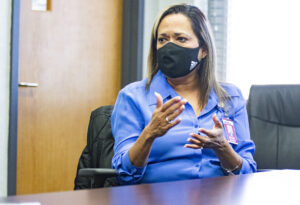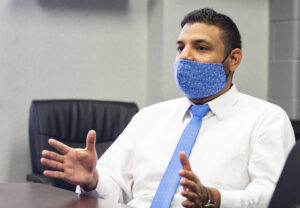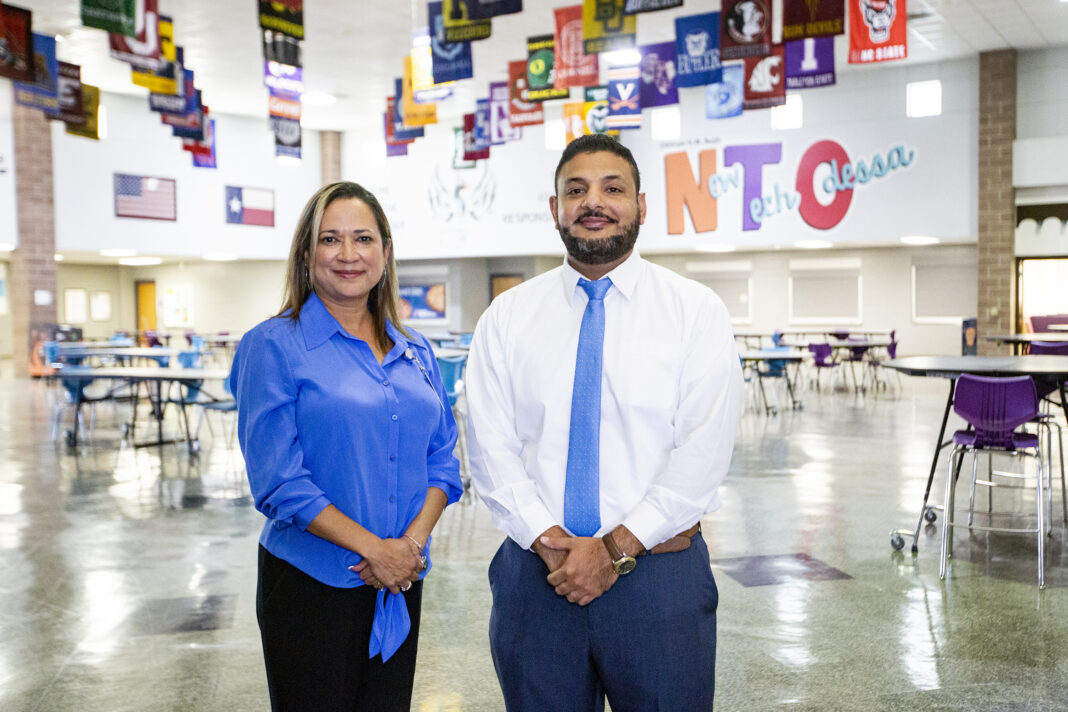For Adrian Vega, Betsabe Salcido and Gerardo Ramirez, it’s hard to believe it’s been 10 years since George H.W. Bush New Tech Odessa started.
Vega was the founding principal and Salcido and Ramirez followed as campus chiefs.
NTO brought project-based learning and one-to-one technology — where each student had a computer — to Ector County ISD. At the time he was asked about coming to New Tech, Vega said he was a middle school principal in East Texas using New Tech concepts.
Shortly after the creation of NTO, University of Texas Permian Basin devised the UTPB STEM Academy and ECISD formed OCTECHS, Vega said.
Vega said Hector Mendez was superintendent at the time and had heard about the New Tech model at a conference.
Through project-based learning, its website says, New Tech Network schools empower and challenge students to learn, succeed, collaborate, communicate and engage in the world around them.
Vega, who is now chief people officer at The Sewell Family of Companies and executive director of the Education Partnership of the Permian Basin, said he was using New Tech methods in terms of the model, but was not connected to the network.
“It was just more of these best practices and trying to instill these certain skills and … project-based learning as a primary mode of instruction, so when the district knew they were going to open up a New Tech high school, I ended up applying and had the opportunity to come out and be the first principal,” Vega said.
He added that his dissertation is on project-based learning.
Part of project-based learning is students creating projects and presenting them to panels or community members for feedback.
“A lot of the elements of the New Tech model just aligned with my own personal educational philosophy. … As a middle school principal who was not connected to any of this stuff, I was wanting to apply these concepts on the campus where I was leading, so it was through my research that I came across it. That’s why, for me, given the opportunity to move out here even if it was across the state and packing up my family, it was too big of an opportunity to (miss),” Vega said.
He said he’s pleased that NTO is still flourishing.
“We were able to establish a firm enough foundation in the early years that we were recognized as a national demonstration site campus, so people would come and look and learn. We were an Apple Distinguished Campus. … We and the district, the staff worked really hard to truly establish a solid foundation that was based not only on these education tenets and principles, but on a culture and climate which is what I really think sets that model, or at least New Tech, NTO, apart,” Vega said.
Ramirez said suspensions, fights and bullying are rare because of the school’s reflective approach to discipline and its culture.
Salcido served as a counselor and dean of students that first year. She also had other roles such as test coordinator.
“… I think that what really made it special was that you started from the ground up,” Salcido said.
They had a chance to look at everything and figure out how it was going to look and what they were trying to achieve for students.
Ramirez said it involved rethinking everything from the master schedule to course offerings and how to be college focused.
“… I know Ms. Salcido put in a lot of hours in those early years (helping) to make the school a reality,” Ramirez said.

Salcido, who is now executive director for bilingual and ESL (English as a Second Language), was at NTO for four years. Vega was her mentor.
She said she worked with outstanding teachers and other staff.
“… A lot of them were first-year, so they were willing to put in the work (and) willing to learn with us in order to create something different for kids. Everybody had a buy in. They had to buy into the model; into the vision. And so from our office staff to our custodial staff, they were all a part of what we were doing. It was truly special in that sense that we all had to come together and work together to make something really different and think differently,” Salcido said.
She added that Vega was good at holding fast to the vision and values of the campus.
“During those years, we worked on our teachers — we call them facilitators — but it’s not just a word. They really had to learn to switch gears and how do we facilitate the learning for our students, which we refer to at NTO as learners, because in a sense, in this building, if you came through this program, we were all learners. We all had something to learn,” Salcido said.
“During the adult learning time every Wednesday, we would come together and look at our projects and look at student work because ultimately that was our measurement: Are the students learning? What are the students demonstrating? What are our students’ outcomes?” she added.

Ramirez, who was Salcido’s assistant principal, said it was a lot of stretching for everyone — students, administrators and facilitators.
“She (Salcido) took me under her wing and then I learned the ropes of administration, specifically at a New Tech school,” said Ramirez, who has also taught at New Tech.
At first, the school was experimental, but it was intentionally experimental. Parental and community involvement also were — and are — part of NTO, as are field trips to colleges and universities during more normal times.
“We were very intentional about building graduates that were leaders,” Ramirez said. “They knew how to collaborate and were very comfortable with public speaking. They could take on major projects, major tasks and be successful about it.”
“I think our groups, once they go out to college and career, they really see the value in the experiences that they had here. And some of the first group, especially, they knew what the vision was but we were still figuring it out together. We were proud of the first couple of cohorts that stuck with us until we solidified who we were and it stood the test of time,” he added. “That empowers in our culture,” which is about trust, respect and responsibility.
Ramirez said it’s not just about the words; it’s about what it means, what it looks like in the classroom and how it’s demonstrated.
It ripples out to everyone whether they are at school, on the school bus or at the mall.
Ramirez noted that NTO has quite a few culture events that have become traditions.
“They’re always purposeful; everything that we did here at New Tech Odessa was about purpose. Our culture day was about helping them see trust, respect and responsibility,” Salcido said.
She added that anyone who has been through New Tech Odessa has been changed.
“And in some way or another, we have all had to learn and to grow. Many of the things that we’ve learned here, we can apply to the things that we do on a daily basis,” Salcido said. “So for example, the value of building instructional capacity, the value of supporting and bringing in professional development, growing our teachers. That’s something that is very, very important. That’s something that I took with me whenever I became the executive director for bilingual and ESL. It’s like how do we build the instructional capacity of our teachers, especially in an area where a lot of our teachers they might be in their first three years of teaching. And so how do we do that? The other thing is also how do we monitor, how do we look at student work, student outcomes to see what the impact of that professional development is … That’s absolutely something that is important to me. It’s also important to value everybody’s strengths,” Salcido said.




